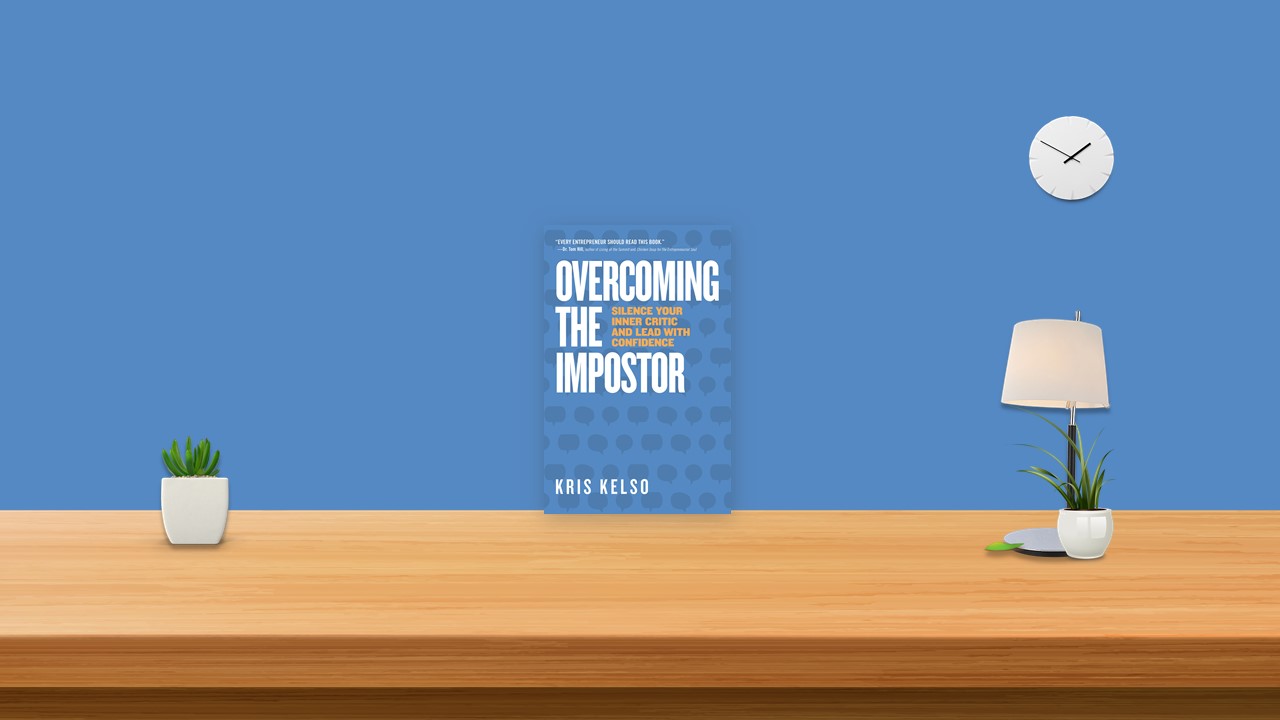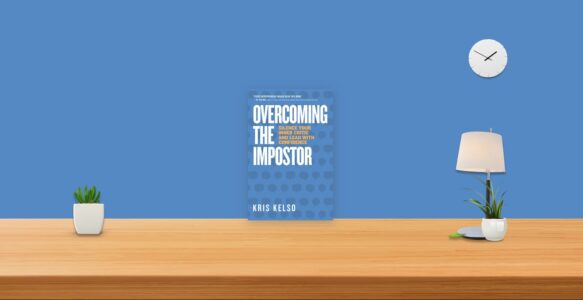Impostor syndrome is an internal struggle—a fear that people see you as something you’re not and that you’re at risk of being exposed as a fraud.
It’s Just An Illusion
The Impostor is like a shadow. We’ve all got one when the conditions are right, and each of ours is unique to us, but it’s not a real thing.
There’s no such thing as darkness; there’s only light or the absence of light. Darkness is just a word to describe the absence of light. There’s no such thing as cold; there’s only heat or a lack of heat. Cold is just a word to describe the absence of heat.
A shadow is not actually a real thing; it’s just a space where the light doesn’t shine quite as bright as the surroundings.
The Impostor is the same way. That voice inside my head that has told me all those things about my business not being real and that I don’t know what I’m doing is not real; it’s just a lack of confidence that looks and sounds an awful lot like me.
It’s More Prevalent Among High Achievers
You might think it would be the other way around, that the more ambitious and driven you are, the less likely you are to feel like a fraud. But the opposite is true. Unambitious people don’t struggle as much with feeling like a fraud because they simply don’t care. They’re not trying to improve; they’re fine with coasting through life and keeping things the way they are. There’s no reason to feel like a fraud if they do the same thing day in and day out for their entire lives.
Author Maya Angelou once said, “I have written eleven books, but each time I think, Uh oh, they’re going to find out now. I’ve run a game on everybody, and they’re going to find me out.”
Nuisance? It’s More Than That
The impostor will pile on the stress.
The impostor will burn you out.
The impostor will slow you down.
The impostor will convince you that you can’t ask for help.
The impostor’s goal is self-sabotage.
Impostor syndrome is more than just a negative thought or feeling; it can have a real and harmful impact on your life if you let it control you.
But there’s another side to that story. The presence of The Impostor can actually be a good sign, letting you know that you’re exactly where you need to be.
When The Impostor Is the Way
#1 You’re Surrounded by Smart and Talented People
Success expert Jim Rohn once said, “You are the average of the five people you spend the most time with.” The company you keep will be a significant driver of the direction of your life and career. If you want to improve yourself, you should regularly be in situations where you might feel inferior.
When you hear The Impostor starting to say things like the statements below, that’s a good sign!
- You don’t belong here.
- You’re in over your head.
- These people are out of your league.
- You can’t keep up.
- You have nothing to offer this group.
It means you’re among people who are going to challenge you, grow you, and inspire you to do more and think bigger. You should not be running from those situations; you should see them for the gift that they are and lean in to those opportunities.
#2 Accomplishment Is on the Horizon
Any worthwhile accomplishment is going to involve friction. There are going to be forces working against you (whether they’re adversarial or just natural), challenges to overcome, and obstacles that get in your way.
Sometimes, the biggest obstacle is in your own head. It’s The Impostor telling you that you shouldn’t even bother because you won’t succeed.
But here again, the presence of that voice is a sign that something good is possible.
Careful! We Need Balance
That doesn’t mean that there’s never a time to feel like a legitimate impostor.
If I walked into a hospital operating room dressed like a doctor, prepared to perform surgery, I would certainly feel like a fraud—as I should! I have no medical training or experience, and despite my ability to learn on the fly and adapt to situations, I have no business performing surgery.
Not only are my chances of success in that situation very low (let’s face it, they’re probably zero), but the stakes are high. The cost of failure could be someone’s life. That’s not the right situation for trial and error.
You should feel like a fraud if you’re being intentionally deceptive or you are violating the law or ignoring standards that are meant to protect people. Those are not the signs of a bold risk-taker; they’re signs of a genuine impostor!
Community + Vulnerability Is the Solution
Entrepreneurship Is a Lonely Road
Entrepreneurship, like many forms of leadership, can be isolating and lonely. Even when you’re surrounded by employees and have a great team, there is no one else who quite bears the burden of ownership that you do.
Community Is the Door
Community is where you gain perspective—where you realize that the problems and challenges you are facing are the same challenges that many others have faced (and beaten) before you and that many are facing alongside you today.
Community is where you hear the stories—both the good and the bad—and realize what’s possible. You see the opportunities and the traps. You learn from others’ victories and from their mistakes.
Unfortunately, when it comes to The Impostor, not all communities are helpful.
Entrepreneurship events and networking groups can actually strengthen The Impostor. The problem is that in most of these communities, everyone is putting their best foot forward; they’re all presenting the best version of themselves, their work, and their business.
Vulnerability Is the Key to Unlock That Door
when you tell your real story—the fully authentic version, in which you win and lose, succeed and fail, and feel confidence and fear—the respect you earn also feels real and authentic. When people tell you that you’ve done well, or that they admire you, or that you have inspired them, you know that they’re talking about the real you and not a phony.
When that happens, you leave no room for The Impostor to attack and erode the encouragement you received. Admiration truly feels like admiration because it’s authentic. Appreciation truly feels like appreciation. Encouragement truly feels like encouragement.
So the key to combating The Impostor is not just community; it’s community with vulnerability. The vulnerability is critical. In fact, community without vulnerability will feed The Impostor, but community with vulnerability will starve it.
Be an Explorer, Not a Tour Guide
Don’t Be a Tour Guide
Tour Guides stick to a well-worn path, taking people only where they are familiar. They avoid unknown territory in order to maintain their confident image.
Are you a Tour Guide? Here are some of the signs. Tour Guides
- are most confident when they’re the most knowledgeable person in the group;
- answer most questions themselves, without seeking other opinions;
- only ask a question when they already know the answer;
- avoid unfamiliar or uncomfortable topics; and
- stick to the plan, even if it’s no longer relevant—they don’t adapt
Be an Explorer
Explorers aren’t concerned with having all the answers; they’re focused on finding the answers.
What are the characteristics of an Explorer? Explorers
- ask more questions than they answer
- ask questions in order to learn rather than to instruct or correct,
- lean in to uncomfortable or unfamiliar territory, and
- start with a plan, but are open and willing to change for the better.
This approach is so much more fun! It’s exciting, adventurous, and at times even terrifying. There’s so much more to learn as an Explorer and so much more to accomplish.
Explorers don’t avoid The Impostor; they disarm it. By being open to continual learning, they avoid the stress of not having the answers.
Entrepreneurs and leaders need to be Explorers.
We have to take risks and break new ground. We must try things, even when success is far from certain. That means we will make a lot of mistakes along the way. We sometimes spend a lot of energy going in a certain direction, only to learn that it was a dead end, and now we have to go back.


